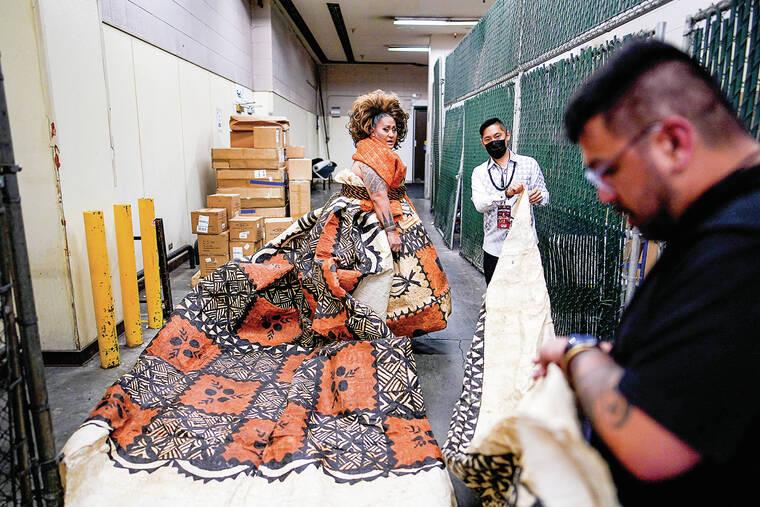Long heritage of Native Hawaiian gender-fluidity showcased in Las Vegas drag show
LAS VEGAS — Drag queens donning the white, red and blue of the Hawaiian flag shimmied across the stage to a throbbing techno remix of “Aloha Oe,” a song composed by Hawaii’s last reigning monarch. Spectators roared as a performer shook her hips in a Tahitian-style dance.
All were “mahu” — a Hawaiian term for people with dual male and female spirit and a mixture of gender traits.
ADVERTISING
They starred in a drag show this week called “Mahu Magic” on the sidelines of a Native Hawaiian convention in Las Vegas to remind the world of the respected place gender-fluidity has held in Hawaiian culture for hundreds of years, while also making a foray into the national conversation about transgender rights.
“It’s a little different from other drag shows because this one has a very specific purpose,” Hinaleimoana Wong-Kalu, who is mahu, a community leader and a master teacher of hula and chanting, told the audience midway through the event.
“It is meant to reinstate the rightful place that mahu have between kane and wahine,” Wong-Kalu said. The crowd erupted in raucous cheers and applause.
Adam Keawe Manalo-Camp, an ethnohistorian who identifies as mahu and queer, said mahu also can include people who would be nonbinary, would define themselves as third gender and those attracted to someone of the same gender.
“That’s what mahu does — mahu offers a space between the concepts of male and female,” Manalo-Camp said.
The Hawaiian language makes it easier to inhabit that spot because it doesn’t have gendered pronouns. In the Western context, Wong-Kalu uses “she” and “her” but prefers the word “o ia,” which is a Hawaiian pronoun used for all people.
“It doesn’t matter whether you’re coming from male to female or female to the male, and it doesn’t matter what your physical articulation is,” Wong-Kalu said. “We have elements of both. Sometimes we completely walk away from one and walk to the other. Sometimes we stay in the middle.”
The “Mahu Magic” show on Tuesday was sponsored by the Council for Native Hawaiian Advancement, a nonprofit organization better known for administering rent relief and job training programs. The council normally holds its conventions in Hawaii but met in Nevada for the first time — coincidentally during Pride month — in an acknowledgement that more than half of all Native Hawaiians now live outside the islands.
Council CEO Kuhio Lewis said he wanted to shine a spotlight on gender-fluidity for those who have lost touch with Hawaiian culture because they’ve had to leave the islands due to rising housing costs and gentrification.
Some Native Hawaiian families now have two or three generations born outside Hawaii and need help connecting to their homeland, Lewis said.
But he also aimed to reach Native Hawaiians who have drifted from their culture in a Hawaii that’s increasingly shaped by continental U.S. influences. About one-third of the 1,200 attendees flew to Las Vegas from Hawaii, while the remainder already lived outside the state.
“Unless we do something to honor, to recognize who we are, we’re going to lose our identity,” Lewis said.
A panel discussion addressed how traditional roles of mahu have evolved over time. More broadly, the convention featured workshops on topics like hula, Hawaiian language and affordable housing.
One dancer in “Mahu Magic” wore a white pantsuit, cape and towering feather headdress while lip-synching to “Sky” by Sonique. A trio danced hula to the modern favorite “Hawaii Calls” in halter-top gowns featuring red and white hibiscus flowers.
All 10 performers live as women. Many other drag shows feature men who live as men but dress as women for the show.
Mahu often have had important roles in Native Hawaiian culture as teachers, healers and keepers of knowledge and traditions.
One story reflecting this history is that of four mahu healers who visited Waikiki from Tahiti more than 500 years ago. Hawaiians placed four boulders on the beach to honor them, which are still visible today.
Despite these deep roots, mahu awareness in Hawaii has faded during centuries of foreign influence. Christian missionaries who first arrived in 1820 taught Hawaiians to shun anything deviating from clearly defined male and female roles. In 1893, businessmen backed by the U.S. government overthrew the Hawaiian monarchy and a few years later prohibited the teaching of Hawaiian language in schools. The U.S. annexed Hawaii in 1898, making it a territory.
Leikia Williams, the drag show’s producer and a performer, said mahu was a derogatory word when she was growing up in Honolulu in the 1980s. She remembers people saying, “Stop acting mahu.”
The support of her “drag house,” consisting of elder mahu and fellow mahu sisters, helped her cope. Williams said her house mother taught her and her sisters to “be who we want to be; be who we are, especially in public. To keep our heads held high.”
Wong-Kalu said influence from the continental U.S. exacerbates anti-mahu views in Hawaii and highlighting mahu during the Las Vegas event was important in countering the prejudice.
“This, for me, is about decolonizing our people to the degree that we understand our rightful place in our own home, of which we still do not have,” Wong-Kalu said.



